- Home
- Leslie Meier
Christmas Card Murder Page 8
Christmas Card Murder Read online
Page 8
As the day wore on, reports flooded in of road accidents and strandings, power outages, a house fire out on Bumps River Road, and even an emergency delivery of a baby. First responders were doing their best to keep up with it all, employing their heaviest equipment, but when even the powerful, extreme-brush Bulldog 4x4 fire truck got stuck, rescuers had to switch to using borrowed snowmobiles.
Phyllis and Lucy had just finished lunch when she was able to get a few words from Fire Chief Buzz Bresnahan, who had just returned from Bumps River Road, and was upset that they couldn’t save the burning house. “At least no one got hurt, the house was empty, but now a couple of old folks have lost their house.” He sighed. “I guess the silver lining is that their daughter lives only a few doors down and they can stay with her, but I’m not convinced they even had insurance.”
“I know everybody did the best they could,” said Lucy, hoping to console him. “These are extreme conditions.”
“Looks like one of those ‘hundred-year storms’ that we get every year now.”
Lucy was about to agree with him when the lights went out, her computer screen went black, and her desk phone died.
“I guess we’re going to be here for the duration,” said Phyllis, peering out the window at the unplowed street. “If they don’t get the plows out, I’m afraid we’re not going to make it home tonight.”
“Now I wish I hadn’t eaten all my lunch. I should’ve saved something for dinner.”
“I think we’ve got some of those peanut butter crackers,” said Phyllis, rummaging through the shelf beneath the coffeepot. “Well, it’ll be a light dinner. There’s only two packs,” she reported.
“Better than nothing.”
“I suppose.” Phyllis sighed and plunked herself down on a chair in the half-light coming through the windows.
“What are we going to do all day, with no computer or phone?”
“Maybe the cell phones still work,” suggested Lucy. “Who should I call?”
“Who’s on your phone?”
“Well, a lot of cops and firefighters, but I don’t want to bother them. They’ve got enough on their hands. I was thinking of somebody in town hall, see what’s going on over there.”
“I’ve got Sandy Greene’s number. We’re neighbors and she waters my plants when I’m away.”
“The town clerk? Perfect.” Lucy added the number to her contacts for future reference, then dialed. Much to her amazement, Sandy answered.
“We’re down to cell phones here at the paper, since we lost our power,” she began, “and I was wondering how you guys are doing over there.”
“About the same,” said Sandy. “Anita got the cribbage board out, so that’s about it for us.”
“Any food?”
“There’s stuff in the staff refrigerator, but I suspect some of it’s been there for quite a while. Leftovers, you know. I’m hoping I won’t have to eat somebody’s expired yogurt.”
“How many of you are over there?”
“Only four or so. Most people were smart enough to stay home.”
Lucy got the names of the hardy workers who were now holed up in the town hall and was about to end the call when she had a brainwave. “Hey, since you’ve got time on your hands, maybe you could do a bit of research for me? From the old paper records?”
“Sure, Lucy. What do you need?”
“Well, I’m just curious about my house. Bill found an old Christmas card when he took down a wall. We’re expanding our bedroom, you see, and I’m curious about it. There’s no name, but I think it was sent to Dorcas Pritchett. She lived there before we bought the house. I’d like to get in touch with her, but I can’t find her. Maybe there’s some info in the town real estate records?”
“Doubtful,” said Sandy. “All we’ve got is tax records. The deed and all that go to the registrar. But,” she added, “it won’t hurt to take a look.”
“Great, I really appreciate it.”
“No problem. Meanwhile, how are you guys doing over there?”
“We’re okay. I’m writing with a quill pen, Phyllis has her knitting, and we’re each having a packet of peanut butter crackers for dinner.”
Sandy laughed. “We complain a lot about technology, but when we lose it . . .”
“Ain’t that the truth,” said Lucy.
She didn’t have to use a quill pen, her Bic worked just fine as she wrote up the bits of information she’d gotten from Sandy and the fire chief. When she finished with that, she got up and walked around, noting that the temperature in the office had dropped to sixty-two. She was doing some yoga poses when her cell phone rang; it was Sandy.
“Talk about luck of the Irish!”
“I’m not Irish.”
“Well, you are lucky, because I found a copy of a tax lien. The previous owners were way behind on their taxes.”
“There was a foreclosure. We bought the house from the bank.”
“And there was a letter from a law firm asking for more time for the owners to pay up, they were trying to do one of those short sales to avoid foreclosure. They would certainly have information about the owners.”
That answered one question, thought Lucy, who had wondered why the Pritchetts let the house go. They had tried to save what they could, going so far as to hire a law firm and attempting a short sale, but hadn’t been successful.
“Great. Who is it? Somebody here in town?”
“No. In Florida,” said Sandy, rattling off the name and letterhead information.
“Thanks. I’ll give them a call,” Lucy said as a blast of wind shook the building. “If I can’t be in Florida, at least I can find out what the weather’s like there.”
“I can pretty much guarantee it’s not snowing.”
* * *
Lucy still had four bars on her cell phone, so she decided to throw caution to the wind and make the call to Florida. The receptionist who answered the phone wasn’t terribly impressed with Lucy’s story and doubted that the firm retained any information from such a distant time in the past, but she finally relented and transferred Lucy’s call to an associate.
Poppy Porter sounded young and perky and seemed quite intrigued by Lucy’s story. “All I do all day is redact documents,” she said, whispering. “I’m the newest in the firm and they’ve got me in the dead file room until somebody dies and frees up an office.”
“Any chance of that happening soon?” asked Lucy, amused.
“I don’t think so. Some of them are really old, but I have this theory that the sun kind of wrinkles them up and preserves them, like raisins.”
“Too bad. Up here it’s the cold, people are frozen. Like peas in the freezer, they never go bad.” She glanced out the window. “We’re having a blizzard right now, in fact.”
“I miss snow,” volunteered Poppy. “And skiing. I love to ski.”
“Well, come on up,” urged Lucy.
“I wish.” Poppy sighed. “So, what exactly are you looking for?”
“Any information you might have about the Pritchett family. Your firm handled the attempted sale of their house, way back when. And I’m especially interested in one member, Dorcas Pritchett, who was also called Doris.”
“I will see what I can find and get back to you,” promised Poppy.
“That would be fabulous. Thanks.”
The day wore on with no further communication from Poppy, but Bill checked in with her from time to time, making sure she was all right. They finally heard from Ted in the late afternoon, calling from the nearby town of Gilead, and Lucy asked about the parole hearing.
“Did they have it? How did it go? Did he get parole?”
“No way. They turned him down flat. So it’s back to jail for Ratcliffe. I got some good quotes from the Holmes family. As you’d expect they’re mighty relieved.”
“Not just the family. I don’t think most people wanted him to go free.”
“No chance of that. Last I saw, two burly guards were taking him up to the co
unty jail for the night, and as soon as the roads are clear, it’s straight back to the state pen for him.” He paused. “So look, if you and Phyllis can’t get home tonight, I think you should bunk down in the police department across the street. They’ve got generators and stuff, it’s your best bet. Plus, you’ll be on the spot if there’s any breaking news.”
“Okay. I think we’ll go now.” Lucy looked around the dimly lit office, where the temperature had fallen to fifty-four degrees and Phyllis was gently snoring at her desk, wrapped in her coat. “It’s getting cold in here.”
“Good idea. But first I want you to get over to the elementary school, where the students who made it to school this morning are sheltering in place. It’s going to make a great photo essay,” he told her. “Take lots of pics.”
“And just exactly how am I going to get to the school?” inquired Lucy.
“I’ve arranged with Marcel Benn to give you a ride on one of his snowmobiles.”
Lucy knew that Marcel owned the Ski-Doo dealership, and also sold motorcycles, ATVs, and Jet Skis, none of which interested her in the least. “Are you kidding? I’ll freeze.”
“It’s just for a couple of blocks, Lucy. It’ll be fun, trust me. Marcel will pick you up in five, and tell Phyllis to close up the office.”
“Better make it fifteen. It’ll take me at least that long to dress for the ride.”
“Dress warm. Good idea,” he said, ending the call.
Phyllis had wakened with a start, and Lucy passed along Ted’s instructions while she got ready to leave. “I was thinking along those lines myself,” she said. “I’d better call Wilf and tell him I’ll be spending the night at the station. He’s probably worrying about me,” she said, reaching for her cell phone.
* * *
It took Marcel rather longer than five minutes to arrive, so Lucy was fully dressed and waiting by the door when he drove up on the snowmobile. The snow had piled up and was blocking the door, but Lucy gave a big push and got it open wide enough that she could wiggle through.
Marcel was dressed for the job in a snowmobile suit that covered him from helmet to boots, and he greeted her with a big smile. She thanked him for giving her the ride, and he told her he and other snowmobile owners had been out all day, rescuing stranded motorists. He handed her an extra helmet, and once that was in place, she climbed on the back of the machine and they were off, not exactly zooming, but gliding steadily through the deserted, snow-filled streets. The weak daylight was already fading on this brief December day and some of the houses and shops had a light or two from a generator, but most were dark, and the town was eerily quiet as the snow muffled sound, except for the snowmobile’s engine.
The elementary school was partially lit, thanks to generators, and principal Jim Sykes greeted Lucy and Marcel at the front door and ushered them to the cafetorium, where the kids were gathered.
“We’ve got games and puzzles, and plenty of food,” he assured them. “Parents can rest easy that their kids will be well taken care of. We’ve even got cots for the night, since this is an emergency shelter for the community.”
“Are you expecting folks to come in for the night?” she asked.
“Not really. Most everybody is snowbound at home, and people around here are well equipped to handle power outages. If they don’t have a generator, they’ve got candles and flashlights and fireplaces or woodstoves. Snow isn’t exactly a novelty in this part of the country.”
Lucy agreed, aware that Bill and Zoe were tucked up cozily in the house on Red Top Road, where Bill always joked they’d have to watch TV by candlelight. “Is it okay if I interview a few of the kids?” asked Lucy.
“Sure. Just check with me after, since some parents haven’t given permission for their kids to be mentioned in media.”
Marcel went in the kitchen, where some of the teachers were having coffee, and Lucy got to work snapping photos of the cozy scene. The kids seemed in high spirits, enjoying this change from the usual routine. “We’ve got hot chocolate,” announced one little boy, “with marshmallows.”
“And they’re going to give us pizza for dinner,” said another.
“And there’s no homework, since we can’t go home,” volunteered a little girl with braids.
“But we’ll be able to go home tomorrow,” said one little boy, probably only in kindergarten or first grade and sounding a bit anxious.
“It can’t snow forever,” declared his friend, a solemn little girl with curly hair.
“That’s right,” agreed Lucy, who was beginning to think that the snow might, in fact, never stop until it reached the eaves of the houses, requiring people to tunnel from place to place.
But when she and Marcel left the school, they noticed that the snowfall was diminishing, and the huge flakes had given place to tiny little specks of glitter that danced in the snowmobile’s headlights. “A good sign,” said Marcel, pointing to the sky where a few stars had appeared and the moon was rising. “So, where to, madam? Do you want to go back to the office?”
“I guess I better make sure Phyllis closed up the office and remembered to unplug the computers in case there’s a surge when the power comes back on,” she told him. “Then I’m planning on going across the street to the police department for the night.”
Marcel smiled. “I’ve heard the jail is pretty cozy.”
“Better than the Pennysaver office, that’s for sure. And I’ll be right in the thick of things, it’s a reporter’s dream. If anything newsworthy happens, I’ll be on the spot.”
“Okay,” said Marcel, starting the engine. Lucy hopped on the back of the machine and they were off. This time the ride was a lot more enjoyable, since the wind had died down and the town looked magical, covered in a thick blanket of snow. Soon, she knew, the plows would be out, followed promptly by the electric company trucks, and life would go back to normal. But for the moment it was like going back in time. Except she wasn’t riding in a horse-drawn sleigh, but on the back of a gasoline-guzzling, noisy machine.
Chapter Nine
Within a few minutes they arrived at the office, which was now completely dark. “Are you sure you want to go in?” asked Marcel. “I can have you over to the police department in two secs.”
“Yeah. I’ll feel better if I know things are secure, and I’ve got the flashlight on my phone.”
“Well, I’ll wait for you.”
“There’s no need. The storm’s over and a little exercise will do me good.”
“Okay,” he said, giving her a wave and driving off.
Lucy tramped through the deep snow to the door, which was unlocked. Even so, she had a bit of a struggle opening it because the snow was piled up against it. No wonder Phyllis had decided not to lock it, she thought, figuring that nobody was out and about, and Lucy might need to retrieve something before heading over to the police station for the night.
No harm done, thought Lucy, when she’d scooped enough snow away with her gloved hands and finally got the door open enough so she could squeeze through. She’d just make sure everything was switched off, unplug the computers and printers, and then she’d make sure to lock the door when she left. No big deal. So she flicked on the flashlight app on her phone and stepped inside, carefully closing the door behind her. Then she cast the light around and was surprised to see Phyllis, who was still sitting at her desk.
“What are you doing here in the dark?” she asked, but at the same time realizing something was very wrong. Phyllis’s eyes were huge, and she couldn’t answer because her mouth was covered with shipping tape. The shiny tape was also wrapped around her shoulders and upper arms, fastening her to her desk chair.
Lucy whirled around and reached for the door, intending to run for help. Before she could even yell, she was caught from behind and a hand was clapped over her mouth. She kicked and squirmed, but was no match for whoever had grabbed her. She tried desperately to free herself, but couldn’t catch her breath, since her assailant had covered both her mouth a
nd nose with a gloved hand. She struggled frantically and tried to pull the hand away from her face, desperate for air, but felt herself weakening and soon all went dark.
When she came to, she was trussed up like Phyllis in cello packing tape. Her mouth was taped shut, her arms were fixed to a chair, and her ankles were bound. She was still dressed in her parka, though she’d lost her hat, so she wasn’t cold, but she did have a terrible headache. Her heart was racing, she was dizzy and sweaty, and she knew she’d pass out again if she didn’t calm down. Slow, steady breaths, she told herself, that was the ticket.
Her captor was holding her phone, which lit his face, and she realized he looked familiar. Like someone she’d known a long time ago, who had aged. It took a few minutes, but it finally came to her: Philip Ratcliffe. But how had he gotten out of jail? What was he doing in Tinker’s Cove?
Then the pieces began to fall into place. She remembered that Ted went to the parole hearing, which was scheduled for today, at the courthouse in Gilead. The hearings usually took place in the state prison, but the Holmes family had requested the change because Sally’s mother was too ill to travel. Not only had she lost her daughter, but she’d been diagnosed with ALS soon after. Her condition had recently deteriorated to the point that she was wheelchair-bound and required oxygen to breathe.
Somehow, she concluded, Ratcliffe had managed to escape. Perhaps a crash due to the snow? Perhaps a mistake? A moment’s distraction and the convict had seized his chance. But what now? Why had he chosen the newspaper office to hunker down from the storm? And what was going to happen to her and Phyllis?
“I’m not gonna hurt you,” he said. “All I want is a car. Have you got a car?”
Lucy nodded and tilted her head toward the street, where her SUV was parked.
“Keys?”
Again she motioned with her head toward the door, where she’d dropped her bag in her struggle with Ratcliffe. He used the light on her phone, flashing it around in the doorway, and when he spotted her purse, he grabbed it. The keys were in an outer pocket and he found them easily, then pressed the fob, and the lights on the car flashed outside the window. “Soon as they plow the street, I’m outta here. So relax and nobody gets hurt.”

 Christmas Card Murder
Christmas Card Murder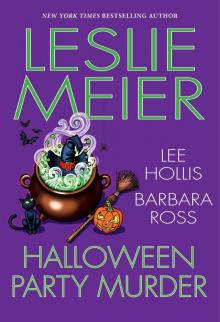 Halloween Party Murder
Halloween Party Murder 'Tis the Season Murder
'Tis the Season Murder Gobble, Gobble Murder
Gobble, Gobble Murder Irish Parade Murder
Irish Parade Murder Bake Sale Murder
Bake Sale Murder Haunted House Murder
Haunted House Murder Father’s Day Murder
Father’s Day Murder Chocolate Covered Murder
Chocolate Covered Murder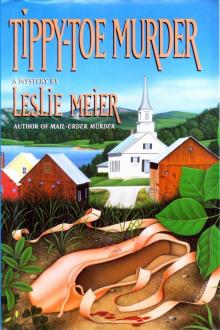 Tippy Toe Murder
Tippy Toe Murder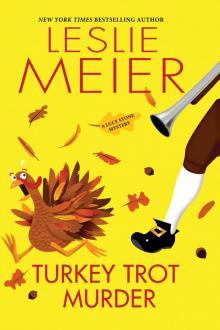 Turkey Trot Murder
Turkey Trot Murder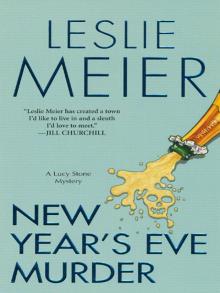 New Year's Eve Murder
New Year's Eve Murder Candy Corn Murder
Candy Corn Murder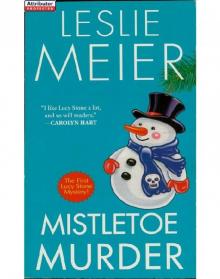 Mistletoe Murder
Mistletoe Murder LStone 20 - Easter Bunny Murder
LStone 20 - Easter Bunny Murder Mother's Day Murder
Mother's Day Murder Star Spangled Murder
Star Spangled Murder Silver Anniversary Murder
Silver Anniversary Murder Wicked Witch Murder
Wicked Witch Murder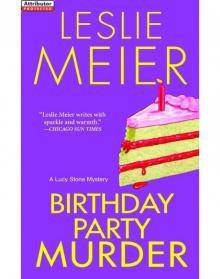 Birthday Party Murder
Birthday Party Murder Wedding Day Murder
Wedding Day Murder French Pastry Murder
French Pastry Murder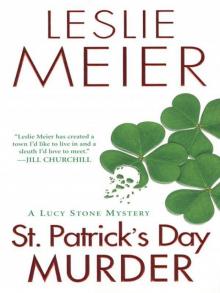 St. Patrick's Day Murder
St. Patrick's Day Murder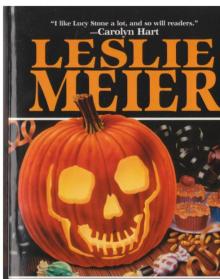 Trick or Treat Murder
Trick or Treat Murder Yule Log Murder
Yule Log Murder Holiday Murder
Holiday Murder British Manor Murder
British Manor Murder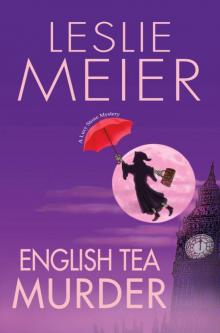 English Tea Murder
English Tea Murder